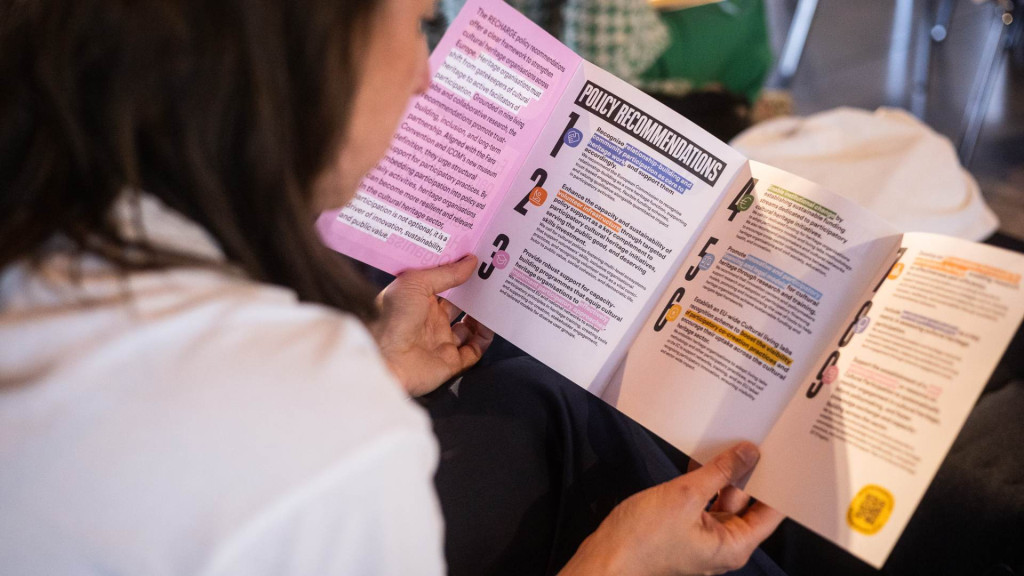Building Resilient Heritage Together
The RECHARGE project focused on participatory approaches and how they can help cultural heritage organisations become more sustainable, resilient and relevant. Building on the previous blog about the RECHARGE Playbook and Knowledge Base, in this blog, I share with you key takeaways from the final event in Prato and explore how the RECHARGE Policy Recommendations can support both cultural heritage organisations and professionals toward more sustainable and participatory practices.
The RECHARGE project focused on participatory approaches and how they can help cultural heritage organisations become more sustainable, resilient and relevant. Building on the previous blog about the RECHARGE Playbook and Knowledge Base, in this blog, I share with you key takeaways from the final event in Prato and explore how the RECHARGE Policy Recommendations can support both cultural heritage organisations and professionals toward more sustainable and participatory practices.

The discussions in Prato confirm RECHARGE’s perspective that participation is not just about audience development but about deeper forms of engagement, like co-creation, co-decision, and co-ownership of cultural heritage. What I heard throughout the event is how difficult it is for organisations to move from one-off projects to long-term, sustainable partnerships with diverse stakeholders. This is where the RECHARGE recommendations shade light.
As a key partner in the project, Sound & Vision played an important role in formulating the policy recommendations. We brought together the research results gathered throughout the project and the concerns of professionals working in the field. Some of the recommendations call for policies and funding schemes that support participatory approaches. Without financial, legal, and structural backing, cultural heritage organisations risk engaging in participation only at a superficial level, lacking the time and resources to embed it in their everyday practice.
The recommendations also stress the importance of building trust through long-term relationships and the need for specific skills and time to build these relationships. In Prato, discussions emphasised the need for capacity building materials and tools, safe experimentation spaces where organisations can test ideas, learn from failure, and grow stronger through collaboration.

Reflections on the RECHARGE Final Event in Prato
The Prato event also highlighted the current role and space for culture and cultural heritage in the European landscape. Keynote speaker Pier Luigi Sacco (University of Chieti-Pescara) and the final panel underlined that culture can address societal challenges. They also discussed the importance of experimentation and innovation for participatory models.
The discussion went beyond the RECHARGE policy recommendations to reflect on how cultural heritage organisations and other stakeholders can use and benefit from them. For policymakers, the recommendations provide evidence-based arguments to rethink funding and governance structures, ensuring that participation is supported in the long run. For cultural heritage professionals, they validate the idea that participatory business models can strengthen both social relevance and financial sustainability.
One example that resonated with me was the connection between participation and financial resilience. By involving communities in decision-making, organisations can open doors to new partnerships, diversify revenue streams, and co-create innovative solutions.
Seeds for the future
At the end of the day, one thing was very clear for me: cultural heritage organisations want to involve communities, but many lack the know-how to design and sustain participatory approaches. Capacity-building is therefore essential. Another strong point of reflection was the role of cultural heritage networks. Transnational networks, in particular, can help overcome barriers by providing guidance, support and legal frameworks that make participation feasible.
Ultimately, the final event showed that participation is not optional, it is central to the resilience of cultural heritage in addressing societal challenges such as inclusion, financial sustainability, and digital transformation. The conversations, ideas, and connections in Prato were seeds for the future. They reminded us that participation matters most when it is supported, trusted, and sustained over time.
The future of cultural heritage is to strengthen participatory and inclusive practices. You can help shape it. Visit the RECHARGE platform to explore the full policy recommendations and discover practical tools for your organisation. Share these insights, start conversations, and advocate with policymakers across Europe to ensure cultural heritage becomes more inclusive, sustainable, and resilient.
Research Newsletter
Want to stay updated on all our heritage and research projects? Subscribe to Beeld & Geluid's Research Newsletter. Please note: the newsletter is in Dutch.
